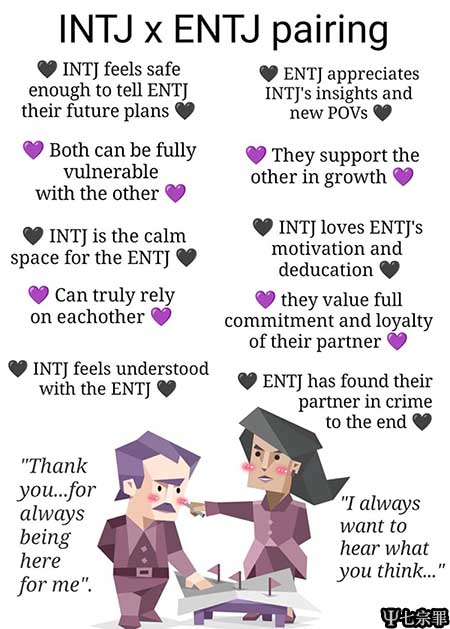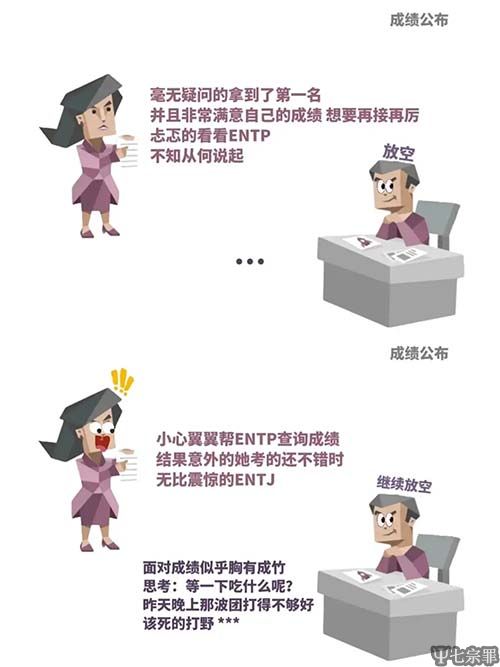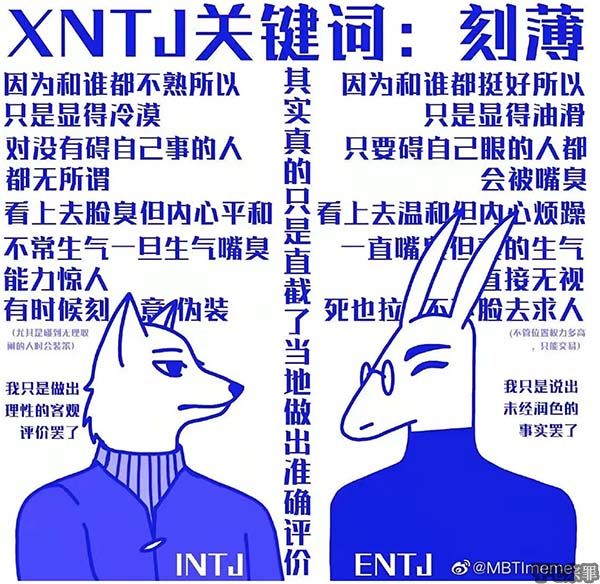ISFJ Personality Type
ISFJ人格型
In contrast to the INFJ, the ISFJ is among the more commonly encountered personality types, thought to comprise upwards of 8% of the general population.
和INFJ比起来,ISFJ是更为常见的人格型,占总人口的8%以上。
To understand ISFJs, we must first consider their dominant function, Introverted Sensing (Si), which compels them to preserve and protect past ways of doing things. This is why David Keirsey has dubbed them “guardians.” Like other SJ types, they grow attached to the routine, familiar, and expected. The more often they do something in a particular way (e.g., eat a certain type of meal for lunch), the harder it is for them to break out of that pattern. The same can be said of their beliefs and worldview. As adults, ISFJs often persist in the beliefs and worldview of their childhood. In sum, they can be seen to rely heavily on past precedent, both behaviorally and ideationally.
要理解ISFJ,首先必须理解他们的主导功能——内向感觉(Si),这一功能让ISFJ倾向于保持过去的做事方式,这也是为什么David Keirsey会把ISFJ称为“守护者型”。
和其他SJ人格型一样,ISFJ偏爱常规的、熟悉的、可预测的事物。
他们越是以某些特定的方式做事(比如中午吃某种特定的餐食),就越是难以打破这种固定的模式,在他们的信仰与世界观方面也是如此。
成年后的ISFJ也往往会始终如一地坚持他们孩童时期的世界观与价值观。

总之,ISFJ在思想和行为上都非常执着于过去。
While sometimes viewed as stubborn or nitpicky, ISFJs are actually more easygoing than they are often given credit for. Since their dominant function (Si) is a Perceiving function, they are naturally inclined to assume a receptive rather than a controlling role. Unfortunately, this often goes unnoticed by the casual onlooker, since Si is introverted in direction. Especially in their free time, ISFJs know how to be leisurely, something the ESFJ can have a harder time with.
尽管偶尔ISFJ会被认为有些固执或吹毛求疵,但通常而言他们都是很随和的。
ISFJ的主导功能(Si)是一种感知型功能,因此他们更倾向于做一个接纳者而不是掌控者,但不幸的是这一点往往不容易被注意到,因为Si功能是一个内向型的功能。
在闲暇时间,ISFJ通常知道如何自得其乐,而这对ESFJ来说可能就比较难。
In sharing the identical set of psychological functions, ISFJs resemble ESFJs. One difference is ESFJs tend to be more warm and engaging upfront, while ISFJs can be a bit more reserved and take longer to warm-up. These two types also differ with respect to inferior function issues, with ISFJs wrestling with Ne and ESFJs with Ti.
ISFJ和ESFJ有着同一套功能类型(只是排序不同),因此有很多相似性。不同的是,ESFJ通常更热情、更主动,ISFJ则有所保留一些,也更慢热。
这两种人格型在一些与第四功能有关的问题上也有所不同,ISFJ的第四功能是Ne(外向直觉),ESFJ的第四功能则是Ti(内向思考)。
ISFJs also resemble the ISTJ, since they share the same dominant and inferior function. However, their auxiliary functions do confer significant differences. ISFJs use Extraverted Feeling (Fe) as their auxiliary function, which grants them a greater measure of social intelligence. While ISTJs may lack some degree of social grace, their auxiliary Te contributes stronger powers of logical and tactical intelligence. ISFJs’ Fe may also contribute an added measure of open-mindedness, at least outwardly. However, this may be more a matter of ISFJs’ concern for interpersonal harmony than a true difference in openness.
ISFJ也有点像ISTJ,因为他们有相同的主导功能和第四功能(Si和Ne)。然而,辅助功能的不同还是带来了明显的差异:ISFJ的辅助功能为外向感觉(Fe),这让他们有更强的社交能力,而ISTJ虽然可能会缺少一些社交属性,但他们的辅助功能——Te(外向思考)又提供了更强的逻辑能力与策略能力。
ISFJ的Fe功能还可能会增加一些“开放感”,至少表面上如此。
但这种“开放感”更多的是ISFJ对外在人际关系和谐性的顾虑,而不是一种真正的“开放”。
Although differing by only one “preference” (i.e., J-P), ISFJs actually share zero functions with the ISFP. ISFPs, who use Se instead of Si, are less concerned with past precedent than ISFJs are. And because of their Fi, ISFPs are more individualistic and less objective in their judging process. Their Se also confers a greater interest in sensory and material novelty. Moreover, ISFPs are inclined toward “hands-on” or what is described as “Realistic” work on the Holland career inventory. ISFJ career-seekers, by contrast, are typically less interested in getting their hands dirty. They are more apt to pursue “Conventional” than Realistic careers. While both ISFJs and ISFPs may take up “Social” sorts of work, ISFJs gravitate toward more abstract occupations, such as teaching, whereas ISFPs, prefer more hands-on careers, such as nursing. ISFJs also make effective managers of people, balancing care and concern with organizational know-how.
ISFJ和ISFP相比,尽管仅有一个字母的差别,但功能类型却完全不同:
ISFP使用用Se(外向感觉)而不是Si(内向感觉),所以并没有ISFJ那么执着于过去;
而ISFP使用Fi(内向情感)而不是Fe(外向情感),在情感取向上会更自我、更主观;
ISFP的Se功能还让他们对感官刺激和新鲜事物很感兴趣。
除此之外,ISFP更倾向于“亲自动手的活”(在霍兰德职业量表中被归类于“实操型”的工作),而ISFJ却对那些“动手型”的工作兴趣不大,他们更愿意选择“事务型的工作”(要求处事精确、完美,关注细节、次序、整理及状况的工作)。
虽然ISFJ和ISFP也都可以从事“社会服务型”的工作,但ISFJ会更喜欢相对抽象的类型,比如教书,ISFP则会更喜欢“需要具体动手”的类型,比如护理。
ISFJ也可以是很好的管理者,能够有效地平衡对员工和对组织结构的关注。
All in all, ISFJs are among the most loyal, dutiful, and responsible of all types. They are admired for their devotion and steadfastness. They make loyal friends and companions, especially for those with similar values and lifestyles.
总而言之,ISFJ是所有人格型中最忠诚、最尽职、最负责的类型,他们的忠诚和坚定令人钦佩。
他们往往是最忠实的朋友与伙伴,尤其是对那些有着共同价值观和生活方式的人来说。
ISFJ Personality Type Development & Functional Stack
ISFJ的人格发展与功能类型
ISFJs’ functional stack :
ISFJ的功能类型:
Dominant: Introverted Sensing (Si)——主导功能:内向感觉(Si)
Auxiliary: Extraverted Feeling (Fe)——辅助功能:外向情感(Fe)
Tertiary: Introverted Thinking (Ti)——第三功能:内向思考(Ti)
Inferior: Extraverted Intuition (Ne)——第四功能:外向直觉(Ne)
ISFJs’ personality type development can be broadly conceived as consisting of three phases:
ISFJ的人格发展可以大致分为三个阶段:
Phase I (Childhood-20s)
阶段一(孩童期-20S)
Phase I is characterized by the development and rise to power of ISFJs’ dominant function, Introverted Sensing (Si). ISFJs use their Si to absorb, integrate, and reflect on acquired information and personal experiences. Since Si corresponds with memory and recall, ISFJs can amass a great deal of information in Phase I.
阶段一主要是发展和培养ISFJ的主导功能——内向感觉(Si)。ISFJ使用Si功能来吸收、整合和反思获取的信息和个人的经历。
由于Si是一个与记忆和回溯有关的功能,ISFJ在培养Si的第一阶段将积累起大量的信息。
Phase I ISFJs may also show some development of their auxiliary function, Extraverted Feeling (Fe), which can serve as a helpful extraverted tool for navigating and managing the outside world.
处于阶段一的ISFJ也可能会适当地发展起他们的辅助功能——外向情感(Fe),Fe功能是一个可以有效地探索和应对外部世界的“外向型工具”。
Phase II (Late Teens-30s)
阶段二(青春期末-30S)
While the inferior function is not entirely dormant or inert in Phase I, the epic tug-of-war between the dominant and inferior does not come to the fore until Phase II. Once ISFJs’ dominant Si reaches a certain threshold of strength and dominance, their inferior function, Extraverted Intuition (Ne), begins to assert itself and play a more prominent role. This can be somewhat confusing since Ne is not next in line in ISFJs’ functional stack, but can be understood as deriving from its bipolar relationship with their dominant Si.
当进入到人格发展的第二阶段,随着ISFJ的主导功能Si(内向感觉)发展到一定的强度和支配地位,第四功能Ne(外向直觉)就会开始进入ISFJ的视线,并逐渐扮演起更有影响力的角色,
这可能会让人困惑,因为在功能排序中,第四功能Ne并不是下一个就首当其冲待开发的功能,第四功能Ne的巨大影响可以理解为其与主导功能Si之间的冲突与角力。
Phase II ISFJs also show increasing use and development of their Fe, allowing them to form and express judgments. They may even begin to tap into their tertiary function, Introverted Thinking (Ti), which serves to cross-check and refine their Fe judgments.
第二阶段也表现为ISFJ会越来越多地开发和使用他们的辅助功能——Fe(外向情感),来形成并表达自己的判断。他们甚至可能开始培养起自己的第三功能——Ti(内向思考)——用来检验和修正他们基于Fe的判断。
Phase III (30s, 40s, & Beyond)
阶段三(30s,40s,及以后)
If all goes well and they are fortunate enough to enter Phase III, ISFJs become increasingly aware of the insidious ways of their inferior Ne. As they become more aware of their inferior and learn to function more healthily as ISFJs, they experience greater balance between their Si and Ne, as well as an increasing sense of peace and wholeness.
如果一切顺利并幸运地进入到人格发展的第三阶段,ISFJ会越来越能知觉到他们第四功能Ne的隐秘存在感,而随着对Ne的知觉,
他们会越来越像一个成熟的ISFJ那样健康地使用各项功能,他们会在Si和Ne之间感受到更好的平衡,也会越来越感觉到人生的安宁感和完整性。

ISFJs’ Dominant Function: Introverted Sensing (Si)
ISFJ的主导功能:内向感觉(Si)
ISFJs use Introverted Sensing (Si) as their dominant function. Si is the function that undergirds ISFJs’ propensity to function as guardians and conservators of tradition. The longer they are immersed in particular set of circumstances, the more difficult it can be for them to open themselves to alternatives. Because Si is a Perceiving function, ISFJs are less inclined to function as frontline activists for their beliefs than ESJs, whose dominant function is a Judging function. Instead, ISFJs prefer to spend time reflecting on the past or their cherished traditions. Many enjoy attending religious services or studying religious texts, activities that strengthen and bolster their Si beliefs.
ISFJ使用内向感觉(Si)作为他们的主导功能,而Si正是使ISFJ成为“传统的守护者”的功能,当ISFJ沉浸在特定的模式中越久,他们就越难以接受其他的选择。
Si还是一种感知型的功能,因此ISFJ并不会像ESJ那样积极主动地捍卫自己的信条(ESJ的主导功能是判断型功能),相反,ISFJ更喜欢花时间去不断地回顾过去和那些宝贵的传统。
很多ISFJ喜欢参与宗教事务或研读一些宗教文献,这些活动都会进一步加强和巩固他们的Si信仰。
One of the most commonly overlooked features of Si is its role in bodily sensation. Namely, Si monitors internal bodily affairs, ensuring that physical needs are optimally satisfied. Being an introverted function, Si is more intensive than Se is, which can make ISFJs more sensitive to a variety of sensory stimuli such as lighting, room temperature, noise levels, sleeping surfaces, etc. They can also be sensitive to strong flavors and unfamiliar textures, which is why they commonly prefer what Se types might consider a bland, simple, or routinized diet.
Si一个最容易被忽视的特征是它“对身体内在的感知”,换句话说,就是Si对内在身体状况的监控,确保身体的各项需求都得到满足。
Si作为内向型功能,比Se强度更高,这让ISFJ对外界的感官刺激更为敏感,比如对光度、温度、噪音水平、睡眠空间等,他们对于强烈的味道和不熟悉的质地也很容易敏感,这就是为什么ISFJ通常更喜欢那些在Se型的人看来过于清淡、粗简、平常的食物。
The bodily role of Si can also influence ISFJs’ health. It may, for instance, allow them to be more attuned to when they are full, thereby preventing overeating. On the other hand, it could play a role in health problems, such as hypochondriasis, in which normal sensations become amplified and interpreted as signs of illness.
Si功能对身体的知觉通常能影响到ISFJ的健康状况,比如,它可以让ISFJ在吃饱时有所察觉,从而防止暴饮暴食,但另一方面,它也可能导致一些健康问题,比如疑病症——把一些正常的感觉过度放大或过度解读成疾病症状。
We can also compare Si with its intuitive cousin, Ni. As Perceiving functions, both can be viewed as functioning rather passively. Both can also be associated with a strong sense of conviction, which is why SJs and NJs alike can seem outwardly stubborn, opinionated, or closed-minded. The primary difference between these two functions is that Ni is a synthesizing function, producing its own impressions and interpretations. Si, by contrast, does not perceive a different reality behind sense data, but compares present experiences to past ones. For Ni, each experience is approached as new and interpreted on its own terms, whereas for Si, the past is granted a more prominent role.
我们也可以来比较一下Si和它的“近亲Ni”,这两个功能都是感知型功能,也都可以被看作是“相对被动”的功能。
这两种功能都与一种“强烈的信念感”有关,这也是为什么SJ和NJ往往看起来都有些固执己见、自以为是。
而Si和Ni的主要区别在于,Ni是一个整合型的功能,它会就事物生成自己的印象与理解,而Si却并不会在庞大的感官信息背后生成一套与众不同的理解,只会将当前的信息与过往的经验进行对比。
对Ni来说,每一次经历都是全新的,都应该以它独特的方式被诠释,但对Si来说,“过往的经验”就是最好的衡量标尺。
While it can be easy for some types to criticize ISFJs for their conservative ways, we should not overlook their value and purpose. In addition to helping and teaching others (Fe), ISFJs help remind us of where we’ve been (Si) in order to prevent us from repeating our past mistakes. Si serves as a necessary cultural counterbalance to Se, reminding us that material resources are not unlimited and should be managed with care and wisdom.
虽然有些人很容易就会批评ISFJ的保守,但我们也不应该忽视他们的价值和作用,除了帮助和教导他人(Fe),ISFJ还能不断提醒我们身处何处(Si)——避免我们重复过去的失误。
Si还与Se一起构成了一种不可或缺的文化平衡——提醒我们物质资源并不是无限的,我们应该谨慎而明智地使用它们。
ISFJs’ Auxiliary Function: Extraverted Feeling (Fe)
ISFJ的辅助功能:外向情感(Fe)
ISFJs use Extraverted Feeling (Fe) as their auxiliary function. As the most interpersonal of all the functions, Fe is attuned to surveying and improving interpersonal feelings and morale. Like INFJs, ISFJs work to cultivate “good feelings” in the interpersonal environment. For the sake of surveying others’ feelings, Fe helps ISFJs read emotional expressions and body language.
ISFJ的辅助功能为外向情感(Fe)。作为所有功能中最具人际作用的功能,Fe可以调节和改善人际关系、提升士气。
与INFJ一样,ISFJ在社交环境中也致力于培养“良好的情感”,而Fe功能可以帮助ISFJ读懂别人的情感表达和肢体语言。
Interestingly, ISFJs may have a more difficult time with perceiving their own emotions than they do those of others. This is due to the fact that their Feeling function is directed outwardly (i.e., extraverted) rather than inwardly. Unlike ISFPs, whose Feeling function is introverted (Fi), ISFJs are less equipped to independently manage their emotions. Hence, when ISFJs find themselves in emotionally taxing circumstances, they often turn to others for support.
有趣的是,在感知和理解自己的情感方面,ISFJ往往还更困难一些。这是由于他们的感觉功能Fe是外向型的,不像ISFP的感觉功能就是内向型的(Fi),因此ISFJ相对来说不太有独立管理自己情绪的能力。
当ISFJ发现自己处于繁重的情感压力之下时,他们常常求助于他人。
Fe also entails an extraversion of judgment. ISFJs utilize their Fe to express their thoughts, feelings, opinions, and grievances. Assuming they have not been severely censored in their upbringing, ISFJs are generally happy to share their feelings and perspectives.
Fe功能还是一个外向的判断功能,ISFJ使用Fe功能来表达他们的想法、感受、观点和不满。
如果ISFJ在成长过程中没有受到过于严苛的限制,那他们应该会是乐于分享自己的感受与观点的。
ISFJs’ Fe can present differently among strangers than it does with their intimates. In larger groups, they may seem characteristically “positive” in their expressions, as part of their attempt to cultivate good feelings. In the company of close confidants, however, they may be more open and direct with their concerns and grievances. In fact, self-expression a la their Fe is critical to their psychological and physical health and well-being. Even if doing so does not provide immediate solutions to the problem at hand, they tend to feel better once they have expressed their feelings, whether through words or tears. This is important for the mates or friends of ISFJs to recognize. While not necessarily looking for others to solve their problems, ISFJs value emotional support, empathy, and reassurance.
INFJ的Fe功能在“亲密的人”和“陌生人”中的表现是有所不同的。
在更大的群体中,他们会努力展示出积极的一面,因为他们总是在试图营造良好的情感氛围。然而,在密友面前,他们往往会进行更坦率和直接的抱怨。
事实上对ISFJ来说,通过Fe功能表达自己对他们的心理健康和身体健康至关重要。即使这样做也并不能立即解决问题,但一旦他们表达了自己的情感,无论是通过言语还是泪水,他们也往往会感觉好一些
——能够意识到这一点对于ISFJ的伴侣或朋友来说非常重要,因为尽管ISFJ并不需要依靠他人来解决问题,但他们确实非常需要情感的支持、同情和安慰。
ISFJs’ Tertiary Function: Introverted Thinking (Ti)
ISFJ的第三功能:内向思考(Ti)
ISFJs use Introverted Thinking (Ti) as their tertiary function. Its role is to further refine their Fe judgments. It adds an element of logic that is less apparent in the early phases of their type development. Less developed ISFJs may draw very little from their Ti. Since their Si-Fe pairing provides them with strong convictions about truth, taking an additional step to Ti may seem unnecessary. With time and maturity, however, ISFJs can grow more comfortable with their Ti and appreciate its inherent value. Ti can help ISFJs think more critically and analytically, serving as an aid and check to their Si-Fe process.
ISFJ的第三功能是内向思考(Ti),它能进一步修正和完善ISFJ的Fe判断,为Fe的判断增添一定的逻辑性,而这种逻辑性在ISFJ人格发展的早期阶段并不明显。
通常发展不够完全的ISFJ可能会认为并不需要开发他们的Ti功能,觉得他们的 Si-Fe功能配对已经能为他们提供一套关于真理的坚定信念,因此,再采取额外的步骤去发展Ti功能似乎是不必要的事情。
然而,随着时间的推移和逐渐成熟,ISFJ会越来越适应他们的Ti功能,并认识到它的内在价值。Ti功能可以帮助ISFJ进行批判性和逻辑性的思考,帮助检验他们的Si-Fe决策过程。
ISFJs’ Inferior Function: Extraverted Intuition (Ne)
ISFJ的第四功能:外向直觉(Ne)
As is true of other types, ISFJs can be blinded to the degree to which their inferior function impacts their decisions and behavior. Without sufficient awareness and integration of their inferior, ISFJs will be prone to unwise decision-making in their lifestyle, careers, and relationships. Therefore, it behooves ISFJs to understand the ways their inferior function, Extraverted Intuition (Ne), manifests in their personality.
和其他人格型一样,ISFJ也容易忽视掉他们的第四功能——外向直觉(Ne),直到这已经影响到他们的行为和决策。
如果没有足够意识并发展他们的第四功能, ISFJ将会在职业选择、生活方式和人际关系上做出不明智的决定。
因此,ISFJ很有必要了解他们的第四功能——外向直觉(Ne)在其人格特征上的表现。
Ne is concerned with connecting ideas, brainstorming new theories, and conceiving options and possibilities. Prone to seeing connections and associations everywhere, it is an unpredictable and highly divergent function. This is why ENPs are often viewed as quirky, absent-minded creatives. While it is true that ISFJs can be routine and conservative, there are numerous ways in which Ne may manifest in their personality.
Ne是一种与思想整合、头脑风暴、灵感捕获有关的功能,它很容易发现任何事物之间的关联和联系,是一种不可预测的、高度发散的功能。
这也是为什么ENP型人格(主导功能为Ne)常常被认为是古灵精怪、天外神游的原因。而ISFJ尽管确实是比较常规和保守的,但Ne功能在他们的人格特质中也有很多表现形式。
One way ISFJs may employ their Ne is finding creative ways to teach or engage with children. Since Ne might be construed as a rather “playful” function, there is part of the ISFJ that is childlike, that wants to play and let loose.
其中一个使用Ne功能的方式就是——ISFJ会通过Ne功能找到一些创新性的方法来教育和启发孩子,由于Ne可以被理解为一个“好玩(有趣)”的功能,因此ISFJ性格中的这一面也将是充满孩子气的,想要尽情玩耍和放松的。
ISFJs may also employ their Ne through hobbies such as reading or word games. Many ISFJs enjoy working crosswords or other sorts of word puzzles. Such activities allow them to exercise their Si recall, while also making connections and associations (Ne). Many ISFJs also enjoy a variety of arts and crafts that allow for creative engagement of their Ne.
ISFJ也可能通过阅读或文字游戏等方式来发展Ne功能,很多ISFJ喜欢玩填字游戏或其他的字谜游戏,这样的活动既可以让他们训练到自己的Si功能(记忆方面),同时又与Ne功能相关(建立联系和联想)。
还有些ISFJ对艺术或手工感兴趣,因为这些也可以创造性发挥Ne功能。
A less healthy means of engaging their Ne is gossip. By proffering speculations about people or events, ISFJs can obtain a quick ego boost for their Ne. ISFJs may also enjoy speculating about various religious or political topics.
另一种不太健康的使用Ne的方式就是“八卦”,通过推测人物或事件的发展,ISFJ可以快速提升他们的Ne功能。
ISFJ也可能会喜欢预测各种宗教或政治话题。
Stock trading is yet another way ISFJs may engage their Ne. Since reading and analyzing market trends might be construed as an Ne-Ti endeavor, ISFJs who can successfully navigate the complexities of the market not only anticipate a financial reward, but a psychological kickback for their inferior function.
“股票交易”是ISFJ使用Ne功能的又一种方式。了解和分析股票市场可以被理解为“Ne-Ti”式的努力过程,能够成功驾驭市场复杂性的ISFJ(第三、四功能为Ti、Ne)不仅能获得经济回报,还能获得心理上的满足(Ne功能)。
Like other types seeking to integrate their inferior function, ISFJs must learn that integration does not occur through direct use or development of their Ne. Instead, they are wise to allow their Ne to remain rather unconscious, functioning passively in the background. This allows them to focus their time and energy on what they do best (Si and Fe), trusting that integration will occur naturally as they consistently and authentically function as ISFJs.
和其他想要整合第四功能的人格型一样,ISFJ必须明白,整合不是通过直接使用或发展Ne功能来实现的,相反,应该明智地让Ne保持在无意识的状态,相对隐蔽而被动地工作,
这能让ISFJ把最主要时间和精力集中在最擅长的事情(Si-Fe)上面,当ISFJ持续而真实地面对自己、发展自我时,整合将自然而然地发生。
1.INTJ型的人如何完善自己,向深处进阶?知乎高赞回答 接受不完美的自己
2.INTJ是N型人格中内耗非常小的一种人格型,也因为内耗小,他们得以全力以赴地去做好自己钟情的事业,而不用在内耗中损伤精力。
3.INTJ为何有如此独特的思维方式?来看看他们的沙箱功能
4.这个世界其实有许多问题,多数人选择与世界妥协,少数人选择与世界斗争
5.听声辩位夹苍蝇,我们怎样快速有效地识别一个团队里面的INTJ?
6.INFP、INFJ、INTP、INTJ 四种类型的文风区别有哪些?(转)
7.为什么有的INTJ身上有种谜之气场?你是不是也这样感觉呢!
8.INTJ 型性格的女生看起来是什么样子的?我感觉是一种本应飒爽但没表现出来的样子
9.MBTI中不同的性格都有哪些之最? INTJ最可能避免依赖他人
10.INTJ的辨识度高不高?在别人眼中是如何看待INTJ性格的
11.简单说下INTJ的几个日常迷惑行为,你是否有感受过呢?
12.当你和INTJ近距离交流的时候,你会发现,他真的只顾着说,都不看你的
13.关于INTJ不得不知道的’死亡凝视’,这究竟是一种什么样的感觉
14.老灵魂INFJ-凡被给予的人,都将被要求;凡被委以重任的人,会有更多的要求 机翻
15.与INTJ相近的人格对比系列之一,INTJ与INFJ 思维VS情感
16.ENTJ元帅型-最容易相信我们是自己命运的主宰者 机翻
17.与INTJ相近的人格对比系列之二,ENTJ与INTJ 元帅VS军师
18.物流师ISTJ-喜欢定义好的规则,却不愿意改变规则或尝试新事物 (机翻)
19.与INTJ相近的人格对比系列之三,INTJ与ISTJ 感觉VS直觉
20.INTP思考者-所有人格中独立且最具哲理性的人格型 机翻
21.与INTJ相近的人格对比系列之四,INTJ与INTP 判断VS知觉
22.与INTJ相反的人格对比系列之一,INTJ与ENFP, 原来她会喜欢他
23.再谈INTP与INTJ这两种性格,究竟有没有孰优孰劣呢?(摘) 只有更好的自己
24.吸引INTJ必须是长时间的保持吸引,否则,可能无法维持到最后
25.来说说,平时沉闷的INTJ会喜欢什么样的音乐呢?(口水文)
26.INFP哲学家型-富有创造力的探索者,喜欢随性生活的人生 机翻
27.八卦一下,作为INTJ的你,会把周围碰到的人分为几类呢? 好几类
28.请想想,不管现在你是什么阶段的INTJ,你会给之前的自己什么建议呢?
29.你能灌醉我的身体但灌不醉我的逻辑(INTJ),MBTI中各类性格喝醉酒时的行为表现 (´•༝•`)
 七宗罪心理
七宗罪心理













